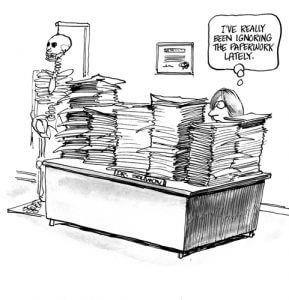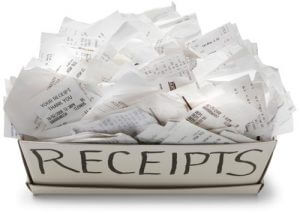
When it comes to keeping records for personal tax purposes, people can range from one extreme to another. Some will obsessively keep track of every slip of paper, filing them neatly by category “just in case” they may be needed. At the other end of the spectrum are those who make a half-hearted attempt and find that they are missing necessary receipts.
Most people, fortunately, fall somewhere in between, but there may be some confusion over what should be kept, and what may be safely discarded. So what records should you keep?
MAKE IT A HABIT.
Well, first off, you should get into the habit of storing things efficiently. What that means to you may be different than for someone else, but try to find whatever system works best for you and follow it consistently. Keeping records does you little good if you can’t find them when you need them. You may use the almost cliché method of storing things in shoe boxes (though it’ll mean more effort at the end of the tax year), or you may go with neatly filed folders in a filing cabinet. Digital storage is also increasingly popular, as well as incredibly easy, given that most people now have access to good-quality digital photography via their smartphones, and access to any number of storage options through various apps and cloud storage.
Whatever method you use, be consistent so that you know where to find everything you need when the time comes.
HOW ORIGINAL!
It’s worth also keeping in mind that there are times when a copy will suffice, but at other times you should have the original records on-hand. CRA will generally accept digital copies, but in some cases they will also require proof of payment so the receipt should be supported by a credit card or bank statement. You should also note that cash is not always best in these situations as there is no proof of payment or tracking of it should you lose the receipt.
WHAT SHOULD BE KEPT?
Keeping receipts and records neatly organized will help you to be prepared at tax time, but what precisely are the items that you should be keeping? Here is a list of documents and receipts you should be hanging onto:
Tax Deductions
- RRSP Contributions

- Professional or Union Dues
- Child Care Expenses
- Moving Expenses
- Child & Spousal Support Payments (additional items almost always required include a Court order and copies of cancelled cheques plus bank statements showing the cheque cleared)
- Investment Expenses (i.e. Professional Fees, Legal, Accounting, Interest, etc.)
- Employment Expenses
- Tools For Trade-Persons
- Home Office Expenses
Tax Credits
- Adoption Expenses
- Student Loan Interest Payments (National Student Loan statements are sent out or available online around February of each year)
- Tuition
- Charitable Donations (Official receipts must show charity name, address, registration of charity, amount of donation and an authorized signature. You may also want to confirm the charity is registered and eligible. Keep in mind that donations made to help your friends or family through GoFundMe or other online sites are not eligible unless they are to registered charities.)
- Political Donations
- Medical Expenses
- Attendant Care or Nursing Home Receipts
- Professional Certification Exam Fees
While you may find yourself with an abundance of receipts by tax time, keeping your records properly filed and organized will certainly help facilitate things. Develop the habit of putting everything in its place, and by tax time, you will find yourself prepared, without having to dig through a pile of paper for that one important receipt.
***This blog is for information only and not to be used as tax advice or planning without first seeking professional advice. Information is subject to change without notice.
